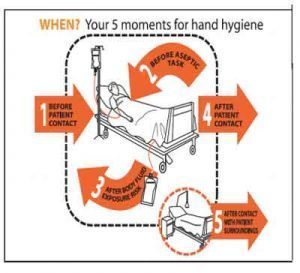- Home
- Editorial
- News
- Practice Guidelines
- Anesthesiology Guidelines
- Cancer Guidelines
- Cardiac Sciences Guidelines
- Critical Care Guidelines
- Dentistry Guidelines
- Dermatology Guidelines
- Diabetes and Endo Guidelines
- Diagnostics Guidelines
- ENT Guidelines
- Featured Practice Guidelines
- Gastroenterology Guidelines
- Geriatrics Guidelines
- Medicine Guidelines
- Nephrology Guidelines
- Neurosciences Guidelines
- Obs and Gynae Guidelines
- Ophthalmology Guidelines
- Orthopaedics Guidelines
- Paediatrics Guidelines
- Psychiatry Guidelines
- Pulmonology Guidelines
- Radiology Guidelines
- Surgery Guidelines
- Urology Guidelines
Hand hygiene protocols lower antibiotic requirement and mortality

In a study, it has been found that following hand hygiene (HH) protocols saves lives across all healthcare facilities including hospitals and nursing homes. Hand hygiene protocols not only lower antibiotic requirement but decrease mortality also.The new study has been published in American Journal of Infection Control (AJIC).
Researchers reviewed the impact of implementing a multicomponent HH program among nursing homes (NH). They found that incorporating consistent measures that prompt staff, residents, and visitors to wash hands can lower mortality and antibiotic prescription rates, and increase overall hand cleaner use. This study is among the first to assess HH practices outside of the hospital setting through a randomized controlled trial.
From April 1, 2014 through April 1, 2015, the study assessed 26 French NHs, randomly assigning 13 to an intervention group and 13 to a control group. The HH program, which targeted NH staff, residents, visitors, and outside care providers, included facilitated access to hand-rub solution using pocket-sized containers and new dispensers; a campaign to promote HH with posters and event organization; and forming local work groups in each NH to focus on HH guidelines and staff education. Staff were given online quizzes at the program's culmination; those who did not score high enough were invited to redo the education portion at a later date.
"Hand hygiene protocols have traditionally focused on acute care settings. Our study is changing this narrative, underscoring that we can take a proven intervention practice and make it work outside of the hospital space, by specifically adapting it to long-term settings," said Laura Temime, the study's lead author and a professor at the Conservatoire National des Arts et Métiers.
Among the results:
- The intervention group that incorporated HH measures reported lower mortality (2.10 in the intervention group vs. 2.65 in the control group, per 100 residents per month) and antibiotic prescription rates (5.0 vs. 5.8 daily doses per 100 resident days). Notably, researchers recorded a 30 percent lower mortality rate in the intervention group in January-March 2015, during which France recorded a large influenza epidemic that most impacted older adults. This underlines the importance of increased HH compliance during epidemic periods.
- The mean quantity of hand-rub consumption was higher in the intervention group by the study's end (7.9 mL per resident per day in the intervention group vs. 5.7 mL per resident per day in the control group). As reference, the two quarters prior to implementation recorded an equal hand-rub consumption between the control and intervention groups (4.5 Ml, per resident per day).
- Antibiotic prescriptions decreased during spring and summer and increased in winter for both groups. Moreover, both groups recorded an uptick in prescriptions from January-March 2015, during the influenza epidemic.
- To note, while the study resulted in a lower mortality rate among the intervention NHs, the study leads flagged that the impact was not sustained after the HH intervention ended (2.53 deaths per 100 residents in the last three months of the study, as compared to 2.87 deaths per 100 residents in the three months after the study concluded). Researchers explained that this could stem from the harvesting effect of winter epidemics, like the flu, that occurred in the control NHs but was in part prevented in the intervention group.
- It took 3-6 months for results of the HH intervention to begin emerging, a timeframe calculated based on the online quizzes and communication between participants and the nurse who led the training.
"This research demonstrates that a sustained educational program focused on hand hygiene can improve practices and may reduce the risk of infection among nursing home patients," said 2018 APIC President Janet Haas, PhD, RN, CIC, FSHEA, FAPIC. "It is crucial that we increase efforts to bolster infection prevention programs in nursing homes because residents of these facilities have more underlying health conditions and are more vulnerable to serious complications from infections."
Nursing homes are known sites of infection prevalence. In the US alone, NHs will report some 3 million infections per year, accounting for the largest share of NH mortality and up to $1 billion in added annual healthcare costs. The death rate due to infections in NH is estimated at 0.6 per 1,000 resident days.
Globally, compliance with HH recommendations remains low among NH staff--tallying in at 14.7 percent in Canada, 17.0 percent in Italy and 11.3 percent in Taiwan.

Disclaimer: This site is primarily intended for healthcare professionals. Any content/information on this website does not replace the advice of medical and/or health professionals and should not be construed as medical/diagnostic advice/endorsement or prescription. Use of this site is subject to our terms of use, privacy policy, advertisement policy. © 2020 Minerva Medical Treatment Pvt Ltd